Unit 5 Do you want to watch a game show Section A(Grammar focus-3c) 原创教学课件(共27张PPT)
文档属性
| 名称 | Unit 5 Do you want to watch a game show Section A(Grammar focus-3c) 原创教学课件(共27张PPT) |
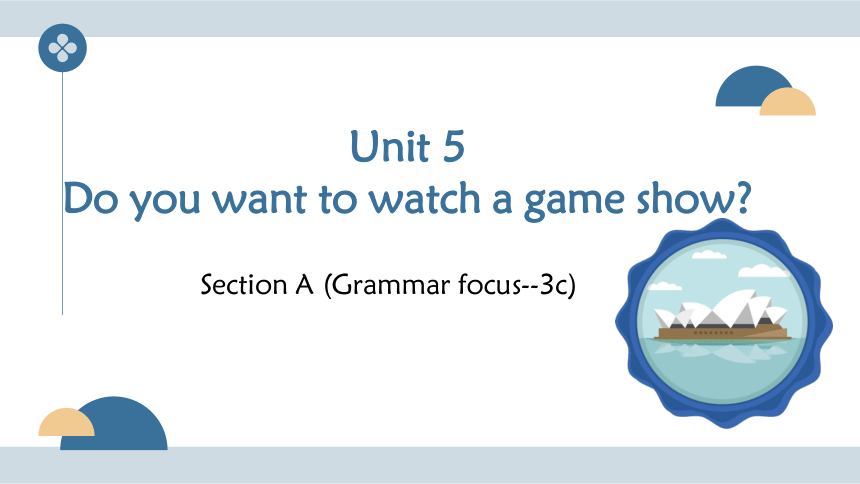
|
|
| 格式 | pptx | ||
| 文件大小 | 15.3MB | ||
| 资源类型 | 试卷 | ||
| 版本资源 | 人教新目标(Go for it)版 | ||
| 科目 | 英语 | ||
| 更新时间 | 2022-10-14 00:00:00 | ||
图片预览

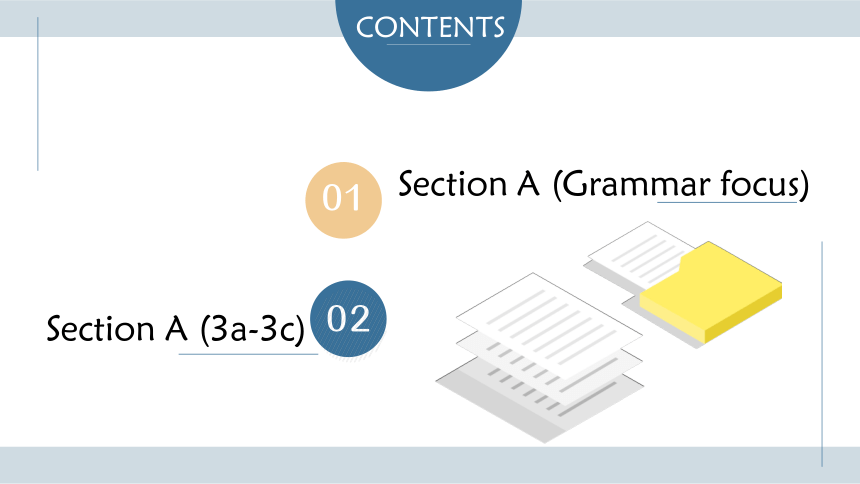
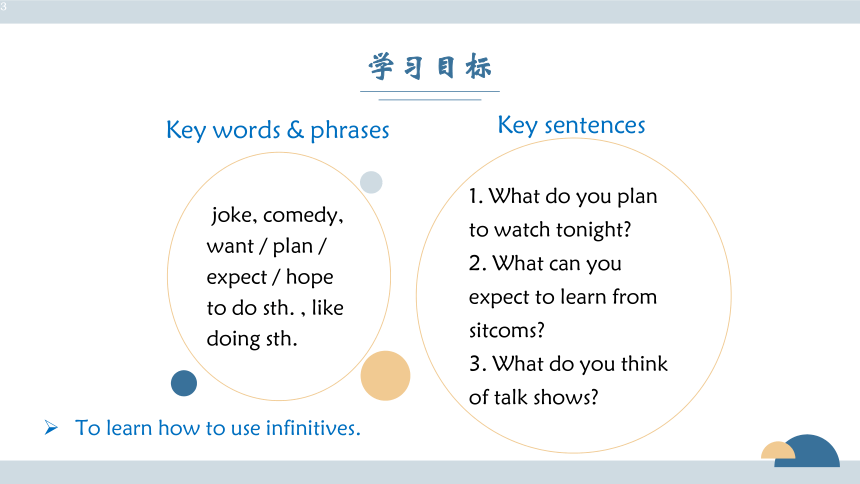
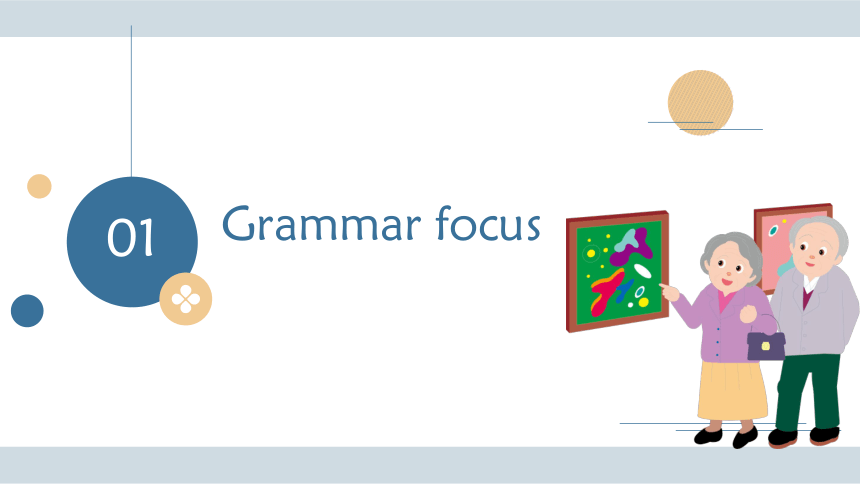
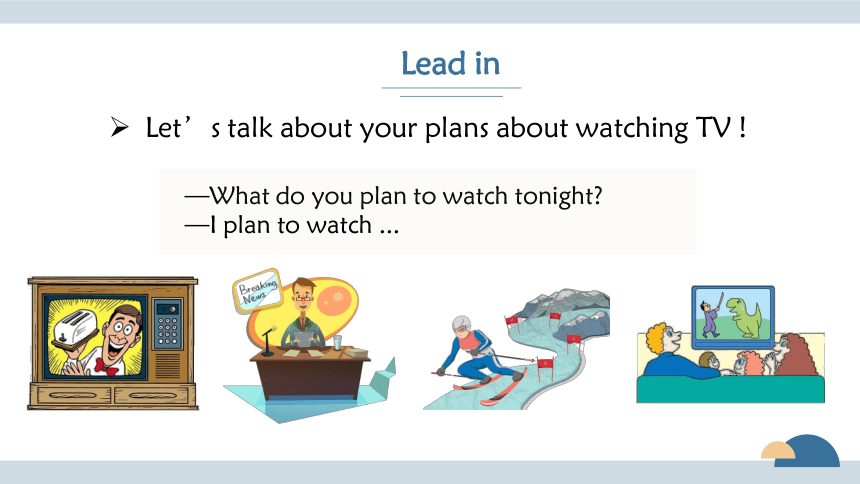
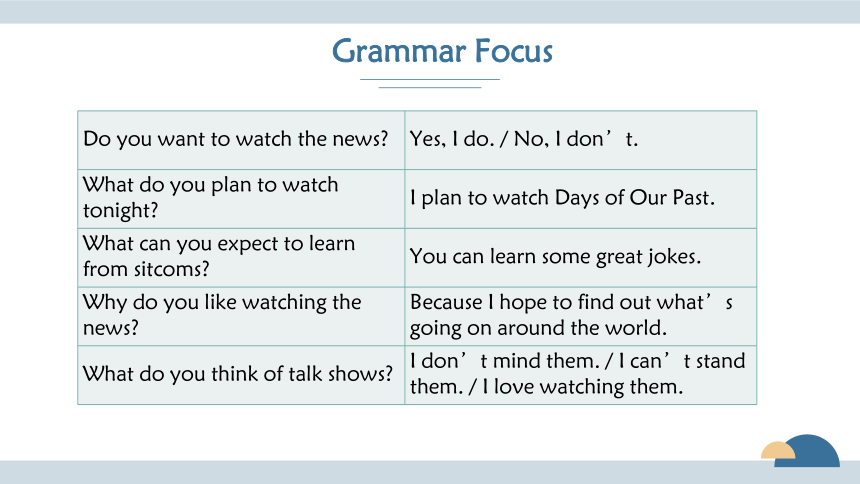
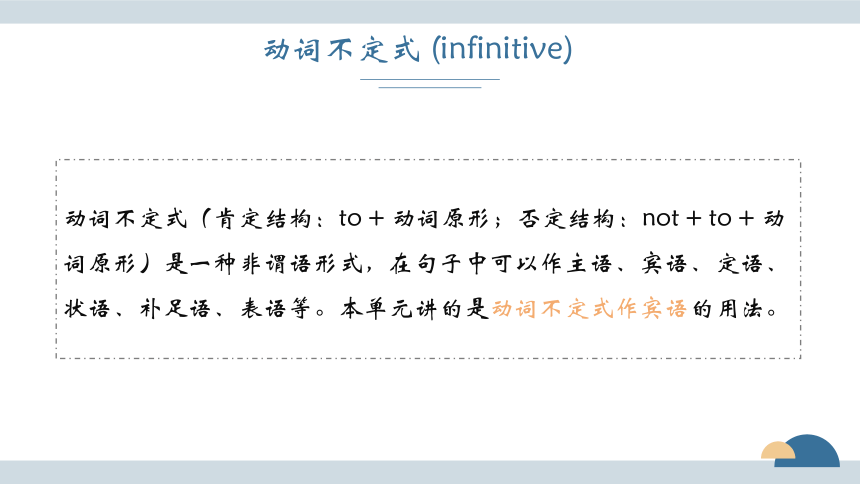
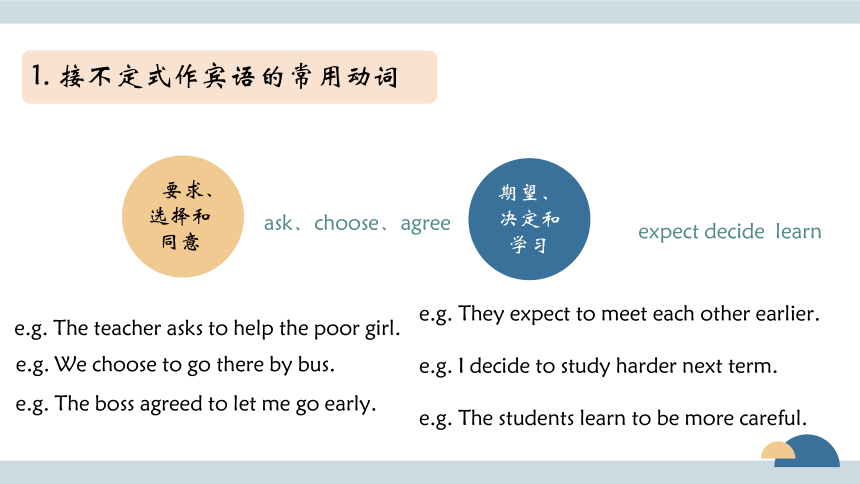
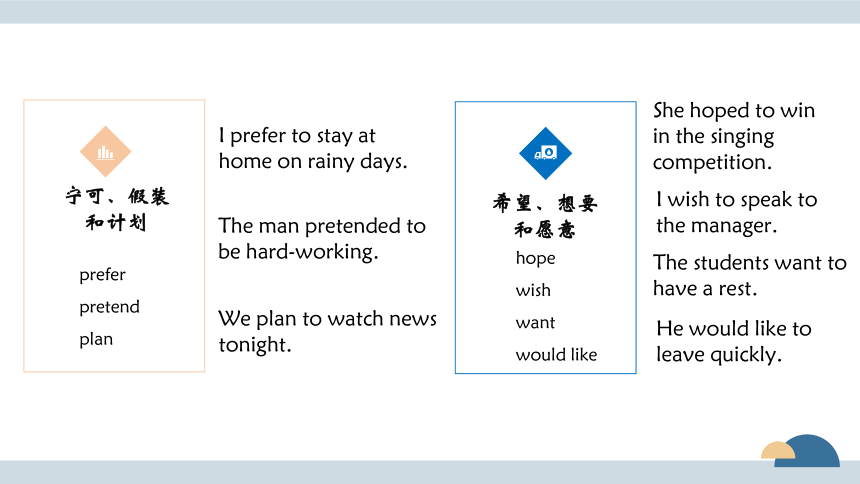
文档简介
(共27张PPT)
Unit 5
Do you want to watch a game show
Section A (Grammar focus--3c)
CONTENTS
01
02
Section A (Grammar focus)
Section A (3a-3c)
3
1. What do you plan to watch tonight
2. What can you expect to learn from sitcoms
3. What do you think of talk shows
学习目标
joke, comedy, want / plan / expect / hope to do sth. , like doing sth.
Key sentences
Key words & phrases
To learn how to use infinitives.
01
Grammar focus
Lead in
Let’s talk about your plans about watching TV !
—What do you plan to watch tonight
—I plan to watch ...
Grammar Focus
Do you want to watch the news Yes, I do. / No, I don’t.
What do you plan to watch tonight I plan to watch Days of Our Past.
What can you expect to learn from sitcoms You can learn some great jokes.
Why do you like watching the news Because I hope to find out what’s going on around the world.
What do you think of talk shows I don’t mind them. / I can’t stand them. / I love watching them.
动词不定式(肯定结构:to + 动词原形;否定结构:not + to + 动词原形)是一种非谓语形式,在句子中可以作主语、宾语、定语、状语、补足语、表语等。本单元讲的是动词不定式作宾语的用法。
动词不定式 (infinitive)
要求、选择和同意
期望、决定和学习
ask、choose、agree
1. 接不定式作宾语的常用动词
e.g. The teacher asks to help the poor girl.
e.g. The boss agreed to let me go early.
e.g. We choose to go there by bus.
expect decide learn
e.g. The students learn to be more careful.
e.g. They expect to meet each other earlier.
e.g. I decide to study harder next term.
宁可、假装和计划
prefer
pretend
plan
希望、想要和愿意
hope
wish
want
would like
I prefer to stay at home on rainy days.
The man pretended to be hard-working.
We plan to watch news tonight.
She hoped to win in the singing competition.
I wish to speak to the manager.
The students want to have a rest.
He would like to leave quickly.
拓展延伸
有些动词既可接动词不定式作宾语,也可接动词-ing作宾语,但两者的意思大不相同。
stop to do sth. 停下来去做某事 Let’s stop to help the old man.
我们停下来帮助这位老人吧。
stop doing sth. 停止做某事 The bell rang and the students stopped talking. 铃响了,学生们停止了交谈。
remember to do sth. 记得要做某事 Please remember to post the letters.
请记得寄这几封信。
remember doing sth. 记得做过某事 I remember posting your letters.
我记得寄出了你的信。
forget to do sth. 忘记要做某事 I forgot to go to the post office.
我忘了去邮局。
forget doing sth. 忘记做过某事 I forgot going to the post office.
我忘了去过邮局了。
try to do sth. 设法做某事;努力做某事 Try to be nice to him.
要尽量对他友好。
try doing sth. 试着做某事 Try being nice to him. 试着对他友好。
mean to do sth. 打算做某事 What do you mean to do 你打算做什么?
mean doing sth. 意味着做某事 His words mean refusing us . 他的话意味着拒绝我们。
2. 特殊疑问词+不定式”作宾语
常见的疑问代词有who, whom, what, which, whose
常见的疑问副词有when, where, how
decide, know, ask, show, teach, guess, find out等动词(短语)后接“特殊疑问词+不定式”作宾语
He hasn't decided where to go for the summer vacation.
We must know what to do next.
3. it作形式宾语,动词不定式作真正的宾语
To do
动词后接不定式作宾语,且宾语补足语是形容词时,常用it作形式宾语,而把真正的宾语(动词不定式)放在句尾。
The Internet makes it possible to get much information in a short time.
I find it difficult to do the job well.
常见的有此用法的动词有: feel, find, make, think, believe, consider等。
4. 不带to的动词不定式作宾语补足语
在动词see,watch,hear,feel等和使役动词(如make,let,have等)后要接不带to的动词不定式结构做宾语补足语。
Let me help you.
The manager made the workers work for 12 hours a day.
I watched the woman get on the bus.
02
3a-3c
Make a conversation and then practice it with a partner.
A: What do you plan to watch on TV tonight
B: I hope to , but I also want to .
How about you Do you a talk show or
A: Oh, I want to .
watch sitcom
watch news
want to watch
talent show
watch talent show
3a
Answer these questions. Give answers that are true for you.
What do you think of game shows
2. What comedy shows do you like
to watch
3. Do you plan to watch a sports
show tonight
4. What can you expect to learn
from the news
3b
Answer to Q 1:
I really love watching them, because they make me happy and relax.
I like to watch The Big Bang Theory and Mr. Bean. They are so interesting.
No, I can’t stand it. I think it’s boring.
I hope to know what happened around the world.
Answer to Q 2:
Answer to Q 3:
Answer to Q 4:
— What can you expect to learn from news report
— I hope to learn what happened around the world.
— What can you expect to learn from talent show
— I hope to learn some talents.
— What can you expect to learn from sports show
— I hope to learn their sport results and spirits.
Ask your classmates questions and write their names in the chart.
Find someone who … Students’ names
wants to watch a movie
hopes to watch a sitcom
expects to watch the news
plans to watch a sports show
never wants to watch a game show
3c
Joke
Language Points 1
You can learn some great jokes.
joke 作可数名词,常用短语:
tell a joke / jokes 讲笑话
play a joke / jokes on sb. 和某人开玩笑
My grandfather likes telling jokes.
We played a joke on John just now.
joke还可以作动词,意为“开玩笑”,同义词为kid。
Are you joking = Are you kidding
like doing sth. 喜欢做......(经常性,习惯)
like sb. / sth.
喜欢.....
like to do sth. 喜欢做......(偶尔)
Tom likes math very much.
Kate doesn’t like tomatoes.
I don’t like to play basketball.
I like watching TV.
Do you like playing basketball
Language Points 2
Why do you like watching the news
一、单项选择
Exercises
1. — do you think of the soap operas
— I don’t mind them.
A. What B. Which C. Why D. How
2.There isn’t any difference between the two. I really don’t know ______ .
A. where to choose B. which to choose
C. to choose what D. to choose which
A
B
3.—Do you have any plans for the coming vacation
—Sure. We decide ______ Sansha in July.
A. visit B. visiting C. visited D. to visit
4.Leonardo DiCaprio, a famous American actor, was always expecting ______ an Oscar and finally he made it.
A. to win B. winning C. not to win D. not winning
D
A
5. Cindy’s grandmother is learning ______ the new mobile phone.
A. use B. uses C. used D. to use
6. —Sam, don’t forget ______ the book to the library tomorrow.
—OK, I won’t.
A. return B. returning C. returned D. to return
7. Please stop and go out for a walk. Remember warm clothes.
A.to study; wearing B. studying; to wear
C. to study; to wear D. studying; wearing
D
D
B
Homework
1. Review and recite the usage of simple present tense and frequency adverbs.
2. Do the exercises in students’ book.
Next
Section B(1a-1e)
Unit 5
Do you want to watch a game show
Section A (Grammar focus--3c)
CONTENTS
01
02
Section A (Grammar focus)
Section A (3a-3c)
3
1. What do you plan to watch tonight
2. What can you expect to learn from sitcoms
3. What do you think of talk shows
学习目标
joke, comedy, want / plan / expect / hope to do sth. , like doing sth.
Key sentences
Key words & phrases
To learn how to use infinitives.
01
Grammar focus
Lead in
Let’s talk about your plans about watching TV !
—What do you plan to watch tonight
—I plan to watch ...
Grammar Focus
Do you want to watch the news Yes, I do. / No, I don’t.
What do you plan to watch tonight I plan to watch Days of Our Past.
What can you expect to learn from sitcoms You can learn some great jokes.
Why do you like watching the news Because I hope to find out what’s going on around the world.
What do you think of talk shows I don’t mind them. / I can’t stand them. / I love watching them.
动词不定式(肯定结构:to + 动词原形;否定结构:not + to + 动词原形)是一种非谓语形式,在句子中可以作主语、宾语、定语、状语、补足语、表语等。本单元讲的是动词不定式作宾语的用法。
动词不定式 (infinitive)
要求、选择和同意
期望、决定和学习
ask、choose、agree
1. 接不定式作宾语的常用动词
e.g. The teacher asks to help the poor girl.
e.g. The boss agreed to let me go early.
e.g. We choose to go there by bus.
expect decide learn
e.g. The students learn to be more careful.
e.g. They expect to meet each other earlier.
e.g. I decide to study harder next term.
宁可、假装和计划
prefer
pretend
plan
希望、想要和愿意
hope
wish
want
would like
I prefer to stay at home on rainy days.
The man pretended to be hard-working.
We plan to watch news tonight.
She hoped to win in the singing competition.
I wish to speak to the manager.
The students want to have a rest.
He would like to leave quickly.
拓展延伸
有些动词既可接动词不定式作宾语,也可接动词-ing作宾语,但两者的意思大不相同。
stop to do sth. 停下来去做某事 Let’s stop to help the old man.
我们停下来帮助这位老人吧。
stop doing sth. 停止做某事 The bell rang and the students stopped talking. 铃响了,学生们停止了交谈。
remember to do sth. 记得要做某事 Please remember to post the letters.
请记得寄这几封信。
remember doing sth. 记得做过某事 I remember posting your letters.
我记得寄出了你的信。
forget to do sth. 忘记要做某事 I forgot to go to the post office.
我忘了去邮局。
forget doing sth. 忘记做过某事 I forgot going to the post office.
我忘了去过邮局了。
try to do sth. 设法做某事;努力做某事 Try to be nice to him.
要尽量对他友好。
try doing sth. 试着做某事 Try being nice to him. 试着对他友好。
mean to do sth. 打算做某事 What do you mean to do 你打算做什么?
mean doing sth. 意味着做某事 His words mean refusing us . 他的话意味着拒绝我们。
2. 特殊疑问词+不定式”作宾语
常见的疑问代词有who, whom, what, which, whose
常见的疑问副词有when, where, how
decide, know, ask, show, teach, guess, find out等动词(短语)后接“特殊疑问词+不定式”作宾语
He hasn't decided where to go for the summer vacation.
We must know what to do next.
3. it作形式宾语,动词不定式作真正的宾语
To do
动词后接不定式作宾语,且宾语补足语是形容词时,常用it作形式宾语,而把真正的宾语(动词不定式)放在句尾。
The Internet makes it possible to get much information in a short time.
I find it difficult to do the job well.
常见的有此用法的动词有: feel, find, make, think, believe, consider等。
4. 不带to的动词不定式作宾语补足语
在动词see,watch,hear,feel等和使役动词(如make,let,have等)后要接不带to的动词不定式结构做宾语补足语。
Let me help you.
The manager made the workers work for 12 hours a day.
I watched the woman get on the bus.
02
3a-3c
Make a conversation and then practice it with a partner.
A: What do you plan to watch on TV tonight
B: I hope to , but I also want to .
How about you Do you a talk show or
A: Oh, I want to .
watch sitcom
watch news
want to watch
talent show
watch talent show
3a
Answer these questions. Give answers that are true for you.
What do you think of game shows
2. What comedy shows do you like
to watch
3. Do you plan to watch a sports
show tonight
4. What can you expect to learn
from the news
3b
Answer to Q 1:
I really love watching them, because they make me happy and relax.
I like to watch The Big Bang Theory and Mr. Bean. They are so interesting.
No, I can’t stand it. I think it’s boring.
I hope to know what happened around the world.
Answer to Q 2:
Answer to Q 3:
Answer to Q 4:
— What can you expect to learn from news report
— I hope to learn what happened around the world.
— What can you expect to learn from talent show
— I hope to learn some talents.
— What can you expect to learn from sports show
— I hope to learn their sport results and spirits.
Ask your classmates questions and write their names in the chart.
Find someone who … Students’ names
wants to watch a movie
hopes to watch a sitcom
expects to watch the news
plans to watch a sports show
never wants to watch a game show
3c
Joke
Language Points 1
You can learn some great jokes.
joke 作可数名词,常用短语:
tell a joke / jokes 讲笑话
play a joke / jokes on sb. 和某人开玩笑
My grandfather likes telling jokes.
We played a joke on John just now.
joke还可以作动词,意为“开玩笑”,同义词为kid。
Are you joking = Are you kidding
like doing sth. 喜欢做......(经常性,习惯)
like sb. / sth.
喜欢.....
like to do sth. 喜欢做......(偶尔)
Tom likes math very much.
Kate doesn’t like tomatoes.
I don’t like to play basketball.
I like watching TV.
Do you like playing basketball
Language Points 2
Why do you like watching the news
一、单项选择
Exercises
1. — do you think of the soap operas
— I don’t mind them.
A. What B. Which C. Why D. How
2.There isn’t any difference between the two. I really don’t know ______ .
A. where to choose B. which to choose
C. to choose what D. to choose which
A
B
3.—Do you have any plans for the coming vacation
—Sure. We decide ______ Sansha in July.
A. visit B. visiting C. visited D. to visit
4.Leonardo DiCaprio, a famous American actor, was always expecting ______ an Oscar and finally he made it.
A. to win B. winning C. not to win D. not winning
D
A
5. Cindy’s grandmother is learning ______ the new mobile phone.
A. use B. uses C. used D. to use
6. —Sam, don’t forget ______ the book to the library tomorrow.
—OK, I won’t.
A. return B. returning C. returned D. to return
7. Please stop and go out for a walk. Remember warm clothes.
A.to study; wearing B. studying; to wear
C. to study; to wear D. studying; wearing
D
D
B
Homework
1. Review and recite the usage of simple present tense and frequency adverbs.
2. Do the exercises in students’ book.
Next
Section B(1a-1e)
同课章节目录
- Unit 1 Where did you go on vacation?
- Section A
- Section B
- Unit 2 How often do you exercise?
- Section A
- Section B
- Unit 3 I'm more outgoing than my sister.
- Section A
- Section B
- Unit 4 What's the best movie theater?
- Section A
- Section B
- Unit 5 Do you want to watch a game show?
- Section A
- Section B
- Unit 6 I'm going to study computer science.
- Section A
- Section B
- Unit 7 Will people have robots?
- Section A
- Section B
- Unit 8 How do you make a banana milk shake?
- Section A
- Section B
- Unit 9 Can you come to my party?
- Section A
- Section B
- Unit 10 If you go to the party, you'll have a grea
- Section A
- Section B
